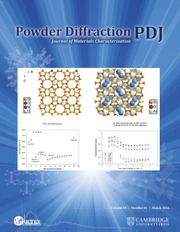Article contents
Using X-ray diffraction for studying the effect of modulation and machining parameters on deformation level in brass particulate produced by modulation assisted machining
Published online by Cambridge University Press: 14 November 2013
Abstract
In present investigation, effect of modulation and machining parameters on deformation level of the chips produced during modulation assisted machining (MAM) has been studied. It is shown that disruption in tool-chip contact during modulation assisted machining helps in the formation of discrete chips. Size and shape of the particles produced in MAM can be controlled by varying modulation and machining conditions. Particulates of different shapes and sizes ranging from 100 µm to 5 mm with an aspect ratio of ~10 were produced using MAM. The morphology of the particulates produced was characterized by scanning electron microscope (SEM). Deformation in chip particulates was investigated using X-Ray diffraction. The crystallite size and internal strain in particulates were evaluated using Scherrer and Williamson-Hall methods respectively. The crystallite size of the particulates was found to decrease with decrease in their size, whereas internal strain in particulates was observed to increase with decrease in their size. Furthermore, the length of particulates was observed to decrease with an increase in the ratio of frequency of modulation (fm) to frequency of workpiece rotation (fw). However, the corresponding change in microstrain and crystallite size was insignificant with change in this ratio.
Keywords
Information
- Type
- Technical Articles
- Information
- Copyright
- Copyright © International Centre for Diffraction Data 2013
References
- 2
- Cited by

